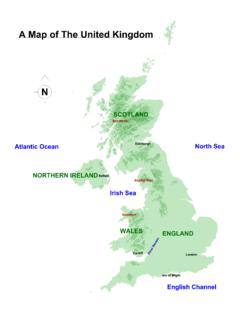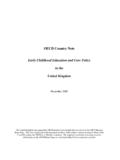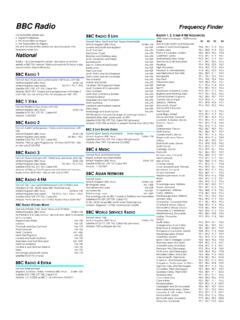Transcription of UNITED KINGDOM - OECD.org
1 UNITED KINGDOM In the UNITED KINGDOM education policy is devolved across four jurisdictions: England, Northern Ireland, scotland and Wales. Key findings By age 15, students in the UNITED KINGDOM perform above the OECD average in science (509 score points) and reading (498 points) and around the OECD average in mathematics (492 points). As is the case across OECD countries, the average science, mathematics and reading performance of 15-year-olds in the UNITED KINGDOM has remained stable since 2006. A greater proportion of students in the UNITED KINGDOM achieved the highest levels in the PISA science assessment the major domain in 2015 compared to the average across OECD countries (Table ).
2 In 2015, 29% of students in the UNITED KINGDOM expect to work in a science-related occupation by age 30, and the country saw the second largest increase on this measure since 2006 across all countries (Figure ). As in many other countries, socio-economically disadvantaged students in the UNITED KINGDOM are less likely to succeed at school than their more advantaged peers. However, equity in education outcomes in the UNITED KINGDOM is better than the OECD average, as 11% of the variation in student performance in science is attributed to differences in students socio-economic status (the OECD average is 13%) (Table ). Students with an immigrant background (first or second generation) in the UNITED KINGDOM , as in many other OECD countries, do not perform as well in science as students without an immigrant background.
3 However, once socio-economic status is accounted for, there is no difference in science performance between non-immigrant and immigrant students in the UNITED KINGDOM (Table ). In the UNITED KINGDOM , boys and girls are equally likely to score at Level 5 or 6, the highest levels of proficiency, in science (12% of boys and 10% of girls) (Table ), and they are equally likely to expect to work in a science-related occupation at age 30 (29% of boys and 30% of girls hold such expectations) (Table ). Student performance in science Students in the UNITED KINGDOM score 509 points in science, on average (Table ), above the OECD average (493 points) and comparable with students in Australia, Beijing-Shanghai-Jiangsu-Guangdong (China) (hereafter B-S -J -G [China] ), Germany, Ireland, UNITED KINGDOM Country Note Results from PISA 2015 2 OECD 2016 Korea, the Netherlands, New Zealand, Slovenia and Switzerland (Table and Figure ).
4 Within the UNITED KINGDOM , students in England score 512 points, on average, and students in Northern Ireland score 500 points, on average both above the OECD average. Students in scotland score 497 points, around the OECD average, while students in Wales score 485 points, which is below the OECD average (Table ). The UNITED KINGDOM s mean performance has remained stable since 2006, decreasing from 515 to 509 score points, which is not a significant change (Table ). Mean performance in science has not changed since 2006 for students in England (516 points in 2006) and Northern Ireland (508 points in 2006), while it has declined in scotland (515 points in 2006) and Wales (505 points in 2006) (Table , and Table S2c in the PISA 2006 Initial Report).
5 On average across OECD countries, 21% of students do not reach the baseline level of proficiency in science, Level 2, meaning they cannot draw on their knowledge of basic science content and procedures to identify an appropriate explanation, interpret data, and identify the question being addressed in a simple experiment. Some 17% of students in the UNITED KINGDOM are low performers, a proportion that has remained unchanged since 2006 (Table ). Some 17% of students in England and 18% of students in Northern Ireland do not reach the baseline level of proficiency in science, while 20% of students in scotland and 22% of students in Wales are low performers (Table ).
6 On average across OECD countries, 8% of students are top performers in science, meaning that they are proficient at Level 5 or 6. At these levels, students can creatively and autonomously apply their scientific knowledge and skills to a wide variety of situations, including unfamiliar ones. Some 11% of students in the UNITED KINGDOM are top performers, but this share shrank a significant 3 percentage points since 2006 (Table ). In England, 12% of students are top performers, as are 8% of students in scotland (8%), 7% of students in Northern Ireland and 5% of students in Wales (Table ). Gender differences in science performance Across the UNITED KINGDOM as a whole, and in England, Northern Ireland, scotland and Wales individually, there is no significant gender gap in science performance (boys score 510 points and girls score 509 points, on average; across OECD countries, the average gender gap is 4 points, in favour of boys) (Tables , and ).
7 Even though gender differences in science performance tend to be small on average, in 33 countries and economies, the share of top performers in science is larger among boys than among girls. In the UNITED KINGDOM , as a whole, there is no significant difference in the share of top performers among boys and girls (Table ), and this is also true in England, Northern Ireland, scotland and Wales (Table ). Student performance in reading Students in the UNITED KINGDOM score 498 points in reading, on average, above the OECD average (493 score points) and comparable with students in Australia, B-S -J -G (China), Belgium, Denmark, France, the Netherlands, Portugal, the Russian Federation (hereafter UNITED KINGDOM Country Note Results from PISA 2015 OECD 2016 3 Russia ), Spain, Sweden, Switzerland, Chinese Taipei and the UNITED States (Table and Figure ).
8 Students in England score 500 points in reading, on average, above the OECD average, while students in Northern Ireland score 497 points and students in scotland score 493 points, both of which are comparable to the OECD average. Students in Wales score 477 points, which is below the OECD average (Table ). The UNITED KINGDOM s mean performance in reading has remained largely unchanged since 2006, rising only slightly from 495 to 498 score points, with an average increase of score points every three years, a statistically insignificant change (Table ). Since 2009, when reading was the major domain, student performance in reading has not changed significantly in England, Northern Ireland, scotland and Wales (Table , and Table in the PISA 2009 Initial Report).
9 About 20% of students in OECD countries, on average, do not attain the baseline level of proficiency in reading, considered the level of proficiency at which students begin to demonstrate the reading skills that will enable them to participate effectively and productively in life. In the UNITED KINGDOM , as a whole, 18% of students perform below Level 2 in reading (Table ). Some 15% of students in Northern Ireland, 18% of students in England and scotland , and 21% of students in Wales do not attain the baseline level of proficiency in reading (Table ). Across OECD countries, 8% of students are top performers in reading, meaning that they are proficient at Level 5 or 6.
10 At these levels, students can find information in texts that are unfamiliar in form or content, demonstrate detailed understanding, and infer which information is relevant to the task. They are also able to critically evaluate such texts and build hypotheses about them, drawing on specialised knowledge and accommodating concepts that may be contrary to expectations. Around 9% of students in the UNITED KINGDOM are top performers (Table ). In England, 10% of students are top performers, while 6% of students in scotland and Northern Ireland and 4% of students in Wales score at this level (Table ). Gender differences in reading performance Girls outperform boys in reading by an average of 22 points in the UNITED KINGDOM .

















